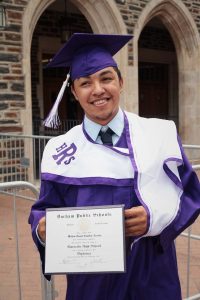My Interview with Wildin’s Biology Teacher: Mika Twietmeyer
This story, told to me by Wildin’s Biology Teacher, Mika Twietmeyer (Teacher at Riverside for the past 13 years), details the community organizing that followed Wildin Acosta’s detainment (Cummins, 2020):
“Wildin was a student in my ESL biology class…I taught him and a lot of his peers, with my colleague, Julie Farkas, who is an ESL co-teacher. He was an awesome, hilarious student, you know; the kids loved him. And he was always really interested in things. We used to go to the Eno River a lot, because we can walk there from our classroom…And he loved that and would always go in and like, catch stuff for everybody. So yeah… those were…my memories, like of him as a student.
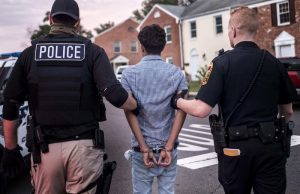
Source: Chicago Tribune
And then that next school year, which was his senior year. In January, while he was on his way to school, one day he was — he was like warming up his car, went back inside, came back out. And he was arrested by two…like plain-clothed ICE officials who were waiting for him. And he had missed a court date.
At that time, it was “Operation Border Guardian,” which the Obama administration had enacted, which was basically targeting young people that had come over, not as like children; like they weren’t…brought over as…babies per se. But they came over the border…after a certain date. And they were turning a certain age and they wanted to send those people back. So…you know, up until maybe this past year, and you’ll have to find these stats. You know, I think the Obama administration deported more undocumented people than other administrations had up until that point. So there were a lot of roundups going on around the Southeast. And…they were targeting high school students and waiting for students at school buses. And there was one instance in Charlotte where ICE officials actually like paid off bus drivers, school bus drivers, to wait at the bus stop longer.
So he was arrested. I think my colleague texted me like that evening or the next day. And, you know, by that next day, he was already in Georgia, at a detention facility. So they move them very quickly. And mostly because, at least in North Carolina, there might be one now in …A lamance. County, I think they might have made a big ICE detention center. But they’re all privately- run detention centers for immigrants.
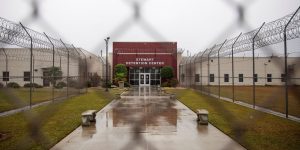
Source: David Goldman, WABE
So there’s a big one in Stewart, Georgia, which is South of Atlanta, basically, in the middle of nowhere. And it’s just a couple thousand. I mean, you know, I mean, most prisons are people of color, but this is, you know, just brown people who are awaiting some sort of deportation decision.
So, pretty much right, then we— the community —really started stepping up. There were vigils. As educators, we were really concerned, because basically, that week after this happened, we saw school attendance totally drop off. Because a lot of you know, students were afraid to come to school, a lot of parents were afraid to drive their students to school. So we saw a huge decrease … amongst our Latinx students coming to school. So that was a concern, and that later led to some…. policy memos…A bunch of us worked in Durham public schools to enact a policy with regards to not letting ICE come on campus. Or police officers, because also police officers like to… It’s just like…easy investigating, like they’ll come in, and if they have a need or question or arrest a student, they’ll do that on school grounds, because they know like, that’s where the student is. So we eventually worked on some policies around that.
But yeah, basically, we started, you know, trying to figure out what it would take to get him out, and why he was there. And, yes, the immigration process is very complicated. For even, you know, I mean, even a person who speaks English and who has a lot of money, right? It’s still a long and complicated process, and the rules are always changing. And the timelines are really long. And he did unfortunately, get some bad legal advice because also, unfortunately, there’s a lot of predatory attorneys who might not give the best advice. And he was actually told by his first lawyer to not attend that first court date, which was the wrong move, which kind of like snowballed into a lot of this.
…So…he was…about to be in his final semester of high school. And all along the way, you know… Immigration is a divisive issue, right? Undocumented students are a divisive issue. But what we were focusing our messaging on, as educators, was that, you know, it should…this is a safe space for any school-aged child. And if you started your education, and you’re literally like, one semester from finishing, you should be able to, you know, finish that. And you have a right, and we have an obligation, to help you finish that.
So, with regards to advocating as educators, that was an easier stance to take. Rather than like, you know, focusing in on like, just the immigration issue, right, really focusing, I mean, it is an immigration issue. But, you know, teachers advocating for some things like this can get tricky at times. So really focusing it on, you know, he needs to finish his education. And that was easy to highlight, especially because he was in this private detention center, because he wasn’t allowed to have any materials. So we weren’t allowed…And even in prisons, you have to get books sent from like the publisher. You can’t just like, send someone a book.
So we tried to send him work. That got denied. He just couldn’t have anything to finish his work.
…It was really tricky to figure out what was going to be the best way to get him out of there. Mostly because, you know…you have to pay to make phone calls…There was one visitor session, like, a week, and it was, you know, far away, right? For his family to get to. His mother’s undocumented, which is like, you know, so she didn’t necessarily want to go visit him in a detention center. Although she had a visa…I think she had work papers, but still like, I wouldn’t trust any of these people. Even if I had regular documentation. I’m not sure I would trust any law enforcement people in that situation.
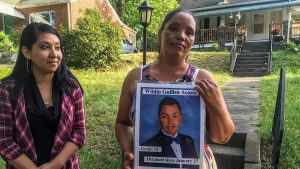
Dilsia Acosta, Wildin’s Mother; Source: ABC11
When we were still in school, we were doing lots of advocacy in Durham. There were lots of like gatherings at Post Offices…there were a lot of rallies. There was one rally and vigil…the night they were supposed to send him back to Central America but they ended up not doing that. And…a lot of schools were wearing purple in support of Wildin and Riverside because our colors are purple.
And, you know, there was definitely some pushback. At the time, my principal was not supportive of us making an effort to bring him back. And there were some, I know, some teachers had some parents, you know, push back on them about wanting to have him come back to school. Mostly based on the like, “Well, he’s illegally here.” Right? You know, “He’s illegal, and, you know, shouldn’t be here,” and, you know, that kind of stuff. Our principal at the time was, I think, pretty conservative, and I don’t think he… he didn’t like the attention it was getting for his school. And he didn’t like…I think it…kind of just went against his personal beliefs, to the point where he couldn’t even support just like, bringing one of our students back to school to finish their high school diploma.
So one of the big things that…the teachers did, especially at Riverside…we made sure that we kept the students and their advocacy in the foreground. And…just help them you know — hear their ideas for what they thought. So really, almost all of the things that were done, were student led. At least most of the visible, you know, aspects of it…including Ms. Holmes and some other teachers…they went to Washington, DC to speak before some representatives from Homeland Security, …as well as the gentleman who was the secretary of education at the time.
At the time, our principal actually wasn’t very supportive of that either. And the students really had to push to get that … approved as an educational opportunity and ended up having to go to some of the school board members they knew, and I will say like, the school board, and the school district, as a whole, was very supportive. A lot of the roadblocks we got were …mostly just from our principal…Besides like, the federal government.
At the end of school that year, my coworker, Julie, and I, and some other advocates from Durham and Charlotte, went to Georgia to visit. And they were also… we were also there to support one of the students for one of his hearings to get out.
And we got to visit with Wildin and talk to some of the other students that were in there. And we’d also brought Wildin’s mom, as part of, like, a caravan of some supporters and people.
But we got to talk to them… of course, not in, like, the same room. It was like they were behind glass and we had to talk to them with telephone things…I mean, it was a pretty secure facility considering, you know, these people, their crime is just being here…I guess when they’re not supposed to be.
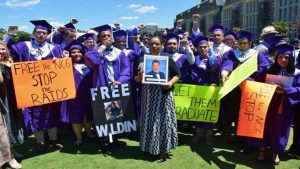
Source: Raleigh News & Observer
So…we did a lot of, you know, a lot of writing letters, calling people. There were a lot of parents that were really supportive, which was really cool. And… a lot of parents of the students that were advocating were really into it. At graduation, there was Axel Herrera, he graduated from Duke, and he’s one of the kind of the spearheads of a lot of the efforts. And he was one of the speakers at graduation. You know, there was a, like…everybody was wearing bracelets in Wildin’s honor. It was really cool.
…He came home in August. So you know, at the end of that summer, he was finally released. And one of the things that’s different than, like, regular prison for immigration detention, is you have to pay like the bond up front. So like, you have to pay, like, the whole thing…So you just have to, like, come up with that money if you want to get out. Whereas, like a regular prison, you can pay like a percentage of that or like, take out a loan type thing. Which is a lot of money…So yeah, so he came back. And another weird thing that had happened, at least in our school over the summer was that our principal decided to like, graduate him…Like, somehow give him the credits to get the diploma…which was totally sketchy.
And so anyway, there was a little bit of a fight to get him back at school for that one. semester.So…we needed some school board’s support for that. And then it was just, you know, hearings, and I went to a couple of his hearings, the closest federal immigration court is in Charlotte.
And yeah, I mean, the case is still kind of out there in the sense that I think he is supposed to go back. And, you know, leave the US and then come back… these weird rules about like, leaving and then coming back and then reapplying for things interesting.
So he did [his last semester]and he graduated…He walked with that next year of students.”
